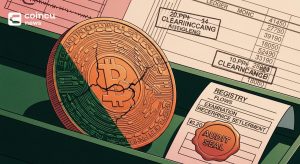German Government Bitcoin Sale Helps Recover Nearly $2.9 Billion
Key Points:
- German law enforcement agencies sold nearly 50,000 Bitcoins, netting approximately $2.88 billion during an “emergency sale” linked to an investigation into piracy and money laundering.
- The German government Bitcoin sale, conducted between June 19 and July 12, involved centralized exchanges and over-the-counter firms.
- The decision to sell was driven by legal requirements to prevent significant depreciation, unaffected by market conditions
According to Decrypt, German law enforcement agencies have successfully completed an “emergency sale” of nearly 50,000 Bitcoins, resulting in a total of approximately $2.88 billion (€2.639 billion).

Read more: Tron Founder Justin Sun Willing to Minimize German Government’s 40,359 BTC Sell-Off
German Government Bitcoin Hits €2,639 Billion Across Transactions
The German government Bitcoin sale was conducted in response to a seizure of the digital currency during an investigation into German and Polish nationals accused of running piracy websites and engaging in money laundering activities. The relevant trials are still ongoing, and the proceeds from the sale are being held by the Free State of Saxony until the conclusion of the criminal proceedings.
The coordinated sale, which occurred between June 19 and July 12, was managed by the Saxon Police’s Central Office for the Safeguarding, Custody, and Utilization of Cryptocurrencies, the Dresden Public Prosecutor’s Office, and the German trading firm Bankhaus Scheich. Under German law, authorities must conduct emergency sales if they anticipate a significant depreciation of Bitcoin, defined as a drop of more than 10%.
Despite fluctuating market conditions, the decision to sell was based solely on legal requirements, with no consideration given to potential price increases. The objective was to execute the sale as promptly as possible.
Market Response With the Bitcoin Sales
According to Arkham Intelligence, an on-chain blockchain analysis company, the Bitcoins were sold through centralized exchanges such as Kraken and Coinbase, along with over-the-counter trading firms like Flow Traders and Cumberland DRW.
When the German government Bitcoin sales began, Bitcoin was trading at around $65,000, but it dropped to as low as $53,700 on July 5. During this period, Tron founder Justin Sun offered to purchase the remaining $2 billion worth of Bitcoin, though neither Sun nor German officials have commented on the legitimacy of this offer.
Additionally, market sentiment was affected by the announcement from Mt. Gox on July 5 that it would begin repaying its BTC and BCH debts to creditors, which contributed to a bearish outlook and increased market volatility. This led to the liquidation of hundreds of millions in derivatives contracts. Despite the turbulence, Bitcoin has since rebounded and is trading higher than it was at the start of the German government Bitcoin sale.
| DISCLAIMER: The information on this website is provided as general market commentary and does not constitute investment advice. We encourage you to do your own research before investing. |





















